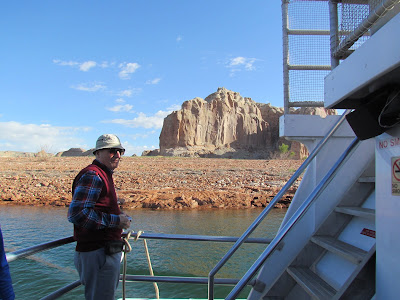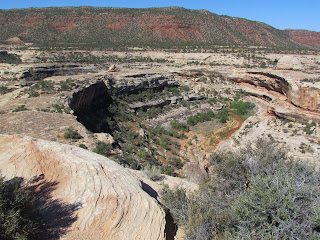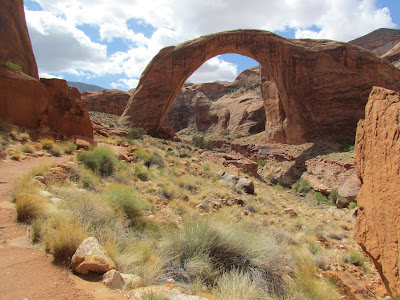2018-14
Blanding Utah
Page Arizona
Lone Rock lake
Powell Utah
Glen Canyon
Rainbow Bridge, the grand adventure!
Campground:
Recapture Lake Recreation Area., Blanding. Boondocking. Free, not
hookups. Camping is free on either side of the lake, off of Radio
Road.
Campground: Lone
Rock Lake Powell, Utah. Almost Boondocking site. Cost: $7 senior
rate. They do have a dump station and water available. Paved road
leading to lake. All sites are dispersed campsites. I took one on
top, though many campers line up along the edge of the lake. During
my time here, it has been very windy and sand was blowing especially
down along the sandy beach lake front.
Distance traveled: 175 miles
After leaving the
Navajo Dam site in New Mexico, I drove into Colorado 30 minutes later
and an hour and a half later, I was in Utah. After all, I truly am
in the 4 corners region where Az/Ut/Co/ and Nm meet up.
I passed so many
places I’ve had the pleasure of visiting in the past, but this year
I’d like to explore a bit more of Utah, and we can only tarry so
long before one realizes the summer is over with. My first stop in
Utah is Blanding, where I’ll dry camp (boondocking) for a couple of
days. I had planned on going to a national forest site I’d been to
in the past, but when I got there, even though it is listed online as
first come/first served camping, all the campsites (even the empty
ones) of which there were plenty. Had signs posted on them that the
site was reserved, most indicating only a couple of days, but still,
I couldn’t take a spot and the camp-host was no where to be found.
| boondocking available on both sides of the lake |
Fortunately this
area has a lot of other BLM and national forest campsites to be had
and I drove a couple miles down the road to the Recapture Lake site.
One tenter was in the dispersed camping area, and after an
unsuccessful attempt to drive the truck and camper through a grove of
cedar trees and rutted sandy roads, I settled on a location
overlooking the lake. Wide open spaces are the best.
One of my day trips
was to the Natural Bridges National Monument. Hwy 95 itself was an
awesome route to take as it dipped deep down into large canyons, back
up over huge mesas some that appeared to be 10 times larger than any
I’d seen in New Mexico. Awesome rock formations along the way kept
me busy oewhing and awhhing all the way to natural bridges.
| hwy 95, Utah what a scenic drive |
| hwy 95 what a wonder western drive |
This is a small
park, with a newly paved single lane, one way loop road to the three
main natural bridges in the park. Lots of view points and hiking
trails leading deep down onto the canyon floor for viewing the
natural bridges up close. Lots of European, Austrian and Canadian
visitors. French motorcycle riders were everywhere as these roads
with all their dips, turns, and surprising views along the way are a
motorcyclist’s dream.
Great views and
enjoyed talking to all the travelers enjoying the scenery.
Back in Blanding I
stopped off at the excellent visitors center and got some great tips
about things to see and do in the area. The Navajo fry bread/taco is
a must. Topped with chili/beans lettuce/tomato/ black olives and
cheese along with salsa and cream cheese.
Many of the canyons
feature Indian ruins, I even saw some cliff dwellings while touring
the Natural Bridges site. The visitor center in Blanding gave me a
lowdown of where many are located close by as well as additional
options for camping in the area. There wasn’t a corner or canyon
of this region as arid as it is that wasn’t inhabited by Anasazi
(ancient Native Indian stone adobe builders) They told me this is a
very safe area to boon-dock as well.
Note: no photos available, lost photos, having major issues with Google Photos, unable to upload photos!!!!
Speaking of my
campsite, with it’s water views, mountains and a mesa near by, on
my second day here, except for the occasional boater, sunbather or
brave swimmer as the water is still very cold, it is mostly very
quiet. To the point that I have not experienced a location like this
in quite some time. Along with having no camping neighbors, at least
for the present, I have no Tv, cellphone, or internet connectivity at
the campsite. The stillness and serenity at first is almost
overwhelming. As I rarely ever experience places such as this. And
I doubt you have either. Often, from what I’ve observed with
boondocking, even though your not connected to utilities, one often
has fellow campers near by. The lack of internet and cell phone
service at the campsite means I am truly disconnected. Not being
able to research my next route and camping options, linking up with
all my friends and relatives on Facebook and e-mail hasn’t happened
in quite some time. Fortunately a short drive into town and I’m
re-connected with the world.
There’s a
stillness about the camper as well. Except for when I have the
ceiling fan running, it too is quiet. No A/C running or the hum of
electronic devices. Only the sound of a wall clock ticking away.
Fortunately, even though it has gotten up to around 85 degrees today,
the camper has remained relatively cool, with a gentle breeze blowing
all day off of the lake. Windows and ceiling vents all open to enjoy
the refreshing air flow. I’ve even turned off the radio as I’m
enjoying the peacefulness of it all. Sitting outside in the shade of
the camper, reading a book or reviewing and editing my photos for
future blog or Facebook use. An afternoon siesta can always be fit
in as well.
Edge of the Cedars
State Park
 |
| extremely rare The highlight being a Macaw feather sash |
 |
| Also on display was a rare Turkey feather blanket including one with it’s feathers intact and one showing just the skeletal frame |
Almost forgot to
tell you about a neat exhibit at the Edge of the Cedars SP. As I’m
heading to Lake Powell which was created by the making of the Glen
Canyon Dam, it was interesting to see a display of photos of some
wonderful Indian petroglyphs that have been flooded once the dam was
built. Along with many Indian pueblo’s and settlements along the
original water way. Sad to think they will remain buried under
hundreds of feet of water, but that is progress. The State Park also
has quite a collection of local ancient artifacts, many clay pots
from era’s going as far back as a couple thousand years. The
highlight being a Macaw feather sash. The Pueblo Indians traded
often with the Mexican Aztec tribes and Live Macaws were a cherished
item. Their feathers were only worn by the most elite in the Indian
tribe. Also on display was a rare Turkey feather blanket including
one with it’s feathers intact and one showing just the skeletal
frame they would have been woven onto. Such rare finds that rarely
if ever would have survived more than a thousand years.
Distance Traveled: 198 miles
 |
| Monument Valley, this is the classic shot often used in TV adds, magazines etc. |
Well all good
intentions to stop along the way for a couple of days in the Mexican
Hat area to revisit places such as Valley of the Gods, Monument
Valley, Gooseneck State Park and all those awesome places throughout
the area before heading to Lake Powell and Page Arizona. But my
efforts were thwarted once I got to Mexican Hat, as they didn’t
have any campgrounds in the almost non-exsistant town. Come to find
out it was the previous town I’d passed through, Bluff Utah, that
has all the Rv parks. Go figure. I could have stayed at Gooseneck
SP ( no utilities)or even a campsite in Valley of the Gods (again no
utilities) , but since my final destination, Lake Powell was
beckoning, I continued on. Of course stopping when ever I could to
take pictures along the way. Monument Valley fortunately had a
number of pull offs to take those all important photos.
I did note that
Monument Valley now has a KOA campground, but as my fellow Rv-ers may
know, they are often overpriced and this one only had picnic table at
each site, with hookups of course, but basically desert setup like a
large dirt parking lot.
 |
| Lake Powell |
 |
| Glen Canyon Dam |
So, it was onto Page
Arizona and my campsite for a couple of day at Lone Rock Lake Powell
Utah. It being right on the Arizona/Utah boarder. After a few false
starts, as I was attempting to get to a visitor center or BLM office
for more information of local camping options (no luck there), I
ended up heading directly to a the campground I’d selected. I was
a bit concerned about heading onto dirt roads to get to the
boon-docking site, but as it turned out, the road leading to the
camping area is newly paved, with park office as well. There was a
$7 charge per night for camping (half off senior rate) as this is a
part of the Glen Canyon National Recreation Area. The other
campground next to the marina on the lake charges around $45 a night
for hookups.
 |
| Lone Rock site also beach camping available it was really windy, lots of sand blowing so didn't stay on the beach below |
How was my first day
at Lone Rock. Hot and windy. Really hot, it got up to 98 degrees
and the winds were around 35-40 mph. Range. Not the most pleasant
of experiences, but I survived. I of course have had to leave the
windows open, so everything is getting a good dusting of fine sand.
There will be a couple of days of cleaning for sure once I leave the
area. Fortunately the last two days in the area the weather cooled
off and the winds settled down considerably.
Page Arizona
The town of Page Az
(originally called Government Camp) got it’s start in 1957 as a
land exchange with Navajo Nation. It was created to provide a
housing settlement for the creation of the Glen Canyon Dam on the
Colorado River. Along with the dams largest hydo power plant in the
U.S. there is also a coal fired electric plant as well, both
producing an enormous amount of electric power for the region. It’s
a modern town of 9,000 with an additional three million visitors each
year.
I’m on the Utah
side and there’s a one hour difference in time zones, so every time
I go into Page, it’s an hour earlier and often many of the places I
want to go are still closed early morning.
The Big Adventure
Rainbow Bridge Boat
Tour ($117)
 |
| the beginning of the adventure, a 6+ hour boat tour of over 100 miles round trip |
 |
| Lake Powell |
It was up and early
for my on Sunday as the tour would begin at 7:30 and I needed to sign
in by 7 am. After packing a lunch and some snacks I headed over to
the Lake Powell Lodge. The tour boat had inside seating and enough
room for 35 passengers above deck. I chose the lower section since
the morning temps were to be a bit on the cool side and I’d be able
to take pictures not only through the windows, open windows as well
as the back deck of the boat. And it was less crowded than up top.
Out tour would take
us on a 100 mile round trip journey over water and last 6+ hours.
The ride through the Glen Canyons of Lake Powell in and of itself
would have been an awesome boat ride, but ours includes the famous
Rainbow Bridge. Of the 3 million visitors that come here each year,
most go to see the famous Slot Canyons run by the Navajo Tribe. But
200,000 visitor each year take the 6 hour or longer journey to see
one of the largest arches/natural bridges in the word, the Rainbow
Bridge. The red and tan sandstone canyons leading us deeper and
deeper up into Lake Powell were an every changing landscape of
buttes, shear cliff walls, strange shapes and the beginning of
crescent shaped rock formation as slices of the sandstone get worn
away or come crashing down over millions of years.
The Rainbow Bridge
began it’s formation over 30 million years ago when the earth’s
crust uplifted Navajo Mountain. From there, mother nature took over
with wind, rain fast moving rivers and streams carving away at
Rainbow Bridge.
Up until the 1960’s
one would have to hike up from the Colorado River for 6 miles, or
hike 12-20 miles around Navajo Mt and through many canyons to get to
the bridge. Today, a three hour ride one way on a fast moving boat
and a one mile hike brings me to the Rainbow Bridge. Legend has it
that a rainbow was turned to stone. The bridge was re-discovered in
recent history in 1909 after hearing many Native Indian stories about
Rainbow Bridge. Some of the famous people who first saw it were,
John Wetherill, Theodore Roosevelt, and Zane Grey author of many
western books. He is even noted for having slept overnight on top of
the Rainbow Arch.
 |
| my first view of the Rainbow Bridge along the one mile hike to the site |
The bridge is 290
feet above of the creek, 275 feet across the canyon. 33 feet wide
and 42 feet thick.
A 25 story building
would sit comfortably under the arch. It’s definitely the largest
natural bridge I’ve ever seen. The trip did not seem long at all
considering the time it took to get there and back. Fortunately we
had plenty of time to take our pictures and actually sit or walk
around the viewing area and see it from as many angles as possible.
With light fluffy clouds changing the scenery by the minutes, with
shade and sunlight playing off the surrounding cliffs and Rainbow
Bridge itself.
Gosh, I sure did
enjoy today’s adventure. I think I’ll have many pleasant
memories of this trip for some time to come along with looking back
at the 260+ photos I took today. Hope you enjoy them as much as I
did. Though I realize the enormous size of the canyons, sandstone
cliffs and the Rainbow Bridge may not be able to be appreciated until
you get a chance to see it in person. But in any case, enjoy seeing
a few of these awesome places through my eyes and hoping you get to
experience some of them one day yourself.
 |
| first views of Rainbow Bridge |
 |
| the rainbow that was turned to stone |
 |
| the mile hike to the site made it all that much more impressive |
 |
| before the dam was built and Lake Powell was created one would have to hike many miles to get to the site |
 |
| walking the trail from the boat landing site |
More Photos:
Rainbow Bridge and
Glen Canyon/Lake Powell (Arizona/Utah) (NOT AVAILABLE, UNABLE TO UPLOAD TO GOOGLE PHOTOS) (may not be able to share photos anymore using Google photos)
Not sure what to do now that I'm no longer able to upload to Google photos..... Bummer.
































No comments:
Post a Comment